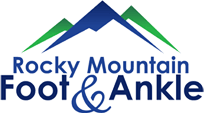Some of the most common causes of heel pain include
Plantar fasciitis
This is caused by painful inflammation of the plantar fascia, a fibrous band of tissue that runs along the sole of the foot and supports the arch. When the fascia is overstretched, it can develop small tears near where it attaches to the heel bone. It’s especially common in people who are highly active, are overweight, or have flat feet.
Heel spur
Over time, long-term strain on the plantar fascia can lead to an abnormal growth of bone at the area where the plantar fascia attaches to the heel bone. Contrary to popular belief, heel spurs are often painless even when seen on an X-ray, but can sometimes cause symptoms depending on their size and location.
Achilles tendinitis
This inflammation of the Achilles tendon is often triggered by overuse, especially in sports with excessive jumping like basketball. It can also come from shoes that fit poorly and dig into the Achilles tendon on the back of the heel. Rarely, it is caused by inflammatory illnesses like rheumatoid arthritis or gout.
Bursitis
This is the result of inflammation in a bursa, which is a kind of fluid-filled sac that serves to reduce friction in many joints. Bursitis may cause pain at the underside or back of the heel. For some people, heel bursitis is related to structural problems of the foot that cause an abnormal gait. For others, shoes with poorly cushioned heels can trigger bursitis.
Local bruises
Just like other parts of the body, your heel can accidentally be bumped and bruised. The heel is most commonly bruised by stepping on a hard, sharp object while walking barefoot.
Trapped nerve
Sometimes heel pain, numbness, or tingling is caused by the compression of a small nerve (a branch of the lateral plantar nerve). Often, this compression is related to a fracture, sprain, or varicose vein near the heel.
Experiencing Heel Pain?
When you have foot or ankle problems, you don’t want just anyone. Call on the friendly experienced foot doctors at Rocky Mountain. We specialize in treating foot and ankle pain or injuries of all varieties.
Diagnosis and Treatment of Your Heel Pain
When you visit Rocky Mountain Foot & Ankle, we’ll take as much time as we need to assess your condition, talk with you about your symptoms, confirm a diagnosis, and put together your customized treatment plan.
In addition to a thorough examination of your feet and walking gait, we may also recommend further diagnostic tests (including X-rays or a neurological examination) if we feel it’s necessary.
Treatment and recovery will of course vary based on your diagnosis and your need. Often, we’ll start by recommending measures you can take at home, including:
RICE therapy
This stands for rest, ice, compression, and elevation. Keep off your feet for a few days, elevate it as much as possible, and if necessary use ice packs and/or compression wraps (as directed) to help control pain and swelling.
Stretching exercises.
Many specific stretches can help reduce the tension on your heels and accelerate recovery.
Avoiding barefoot walking
Being barefoot can increase the stress on your arches and heels, especially if you have abnormalities in your foot shape or walking gait.
Shoe gear modifications
It’s not enough to simply wear shoes—they need to be the correct shoes for your feet and for your activities!
If these simple measures do not provide the complete relief you deserve, or we determine at your appointment that they are not likely to do so, we may recommend further treatment approaches such as:
Injection therapy
For stronger, longer-lasting pain relief.
Strapping and padding
To help support and reduce strain on the heels.
Night Splints
If you have plantar fasciitis, splints can help keep your fascia stretched at night, reducing early-morning pain.
Orthotics
We’ll help you determine whether an off-the-shelf insert may be sufficient, or if you would benefit more from a custom solution.
Regenerative therapies
For the most stubborn pain, and those cases where you want to minimize the recovery time as much as possible, we may recommend soft tissue treatments that help accelerate the body’s natural repair mechanisms and can often trigger much faster relief.
Surgery may be considered if you still can’t find relief, but this is only necessary in a very small minority of overall heel pain cases. The vast majority can be solved using the above treatment options, or other conservative or minimally invasive procedures.


.jpeg) Although we treat almost every kind of foot and ankle problem at Rocky Mountain Foot & Ankle, heel pain is probably the symptom we hear about most. Although it may seem like a simple problem on the surface, heel pain can be a lot more complex—and a lot more serious—than most people realize.
Although we treat almost every kind of foot and ankle problem at Rocky Mountain Foot & Ankle, heel pain is probably the symptom we hear about most. Although it may seem like a simple problem on the surface, heel pain can be a lot more complex—and a lot more serious—than most people realize.